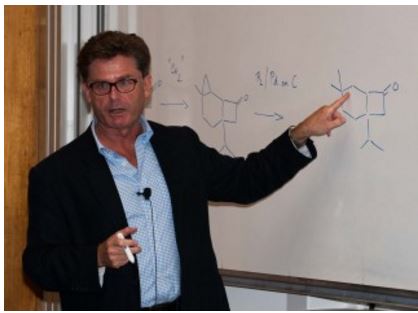Royal Society of NSW News & Events
Liversidge medal winner lecture 2014
"Recent studies on the total synthesis of natural products and related systems"
 Professor Martin Banwell
Professor Martin Banwell
Research School of Chemistry
Institute of Advanced Studies
Australian National University
Canberra
Thursday 20 November 2014
Lecture Theatre 4, School of Chemistry, University of Sydney
Professor Banwell is an organic chemist and is one of Australia's most accomplished researchers into the synthesis of complex organic compounds. In this year's Liversidge Research Lecture, he described work that has been done in his group over a number of years to synthesise materials that have wide-ranging applications, especially as pharmaceuticals. The starting point for his work is a family organic chemicals called arenes. These are substances based on a structure of six carbon atoms arranged in a ring, with each carbon atom having a hydrogen atom attached – this substance is known as benzene. Some of the hydrogen atoms can be replaced by other substituents, for example, instead of one of the hydrogen atoms, methyl, bromine, chlorine, trifluorocarbon, hydroxyl, carboxyl etc groups can be substituted. These can then be used as building blocks, using a variety of synthetic pathways, to make much more complex substances.
Until quite recently, many of these syntheses were done using a variety of chemical reactions that have been developed by organic chemists over the last 150 years. One of the problems that arises with this approach is that substances with the same chemical formula can have different shapes. For example, substances that have the same chemical formula but be mirror images of each another, in much the same way as the right-hand is the mirror image of the left-hand – these are called enantiomers. Often, one enantiomer will have little physiological effect in comparison to the other. In the last 15 years or so, genetically-modified organisms have been developed that allows synthesis of these substances that favours production of the biologically-active enantiomer.
Professor Banwell described his work to develop synthetic pathways, starting with the simple substances described above and reacting these with genetically modified e. coli to produce an arene with two adjacent hydroxyl groups, in addition to the other reactive site. This results in an intermediate that allows a great variety of subsequent synthetic pathways, allowing synthesis of a very large number of biologically active substances. Two examples of these are vitamin C and the influenza drug Tamiflu. Professor Banwell went on to describe a complex sequence of reactions that has enabled his group to synthesise a substance called Ribisin C, the substance that, at very low concentrations, appears to have a marked effect on the stimulating neurite growth in PC12 cells. (Neurites are projections that growth from neurons [nerve cells] as they develop and PC12 cells are particular type of rat neuron that is used in medical research.) It is hoped that this research work may lead to new treatments for neurological diseases and damage to the nervous system. Professor Banwell's group is also working on novel pathways for making codeine, an opioid that is currently derived from opium poppy production. A synthetic pathway could, potentially, lead to a much less expensive production process for opiates.

